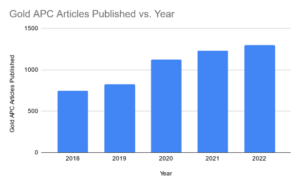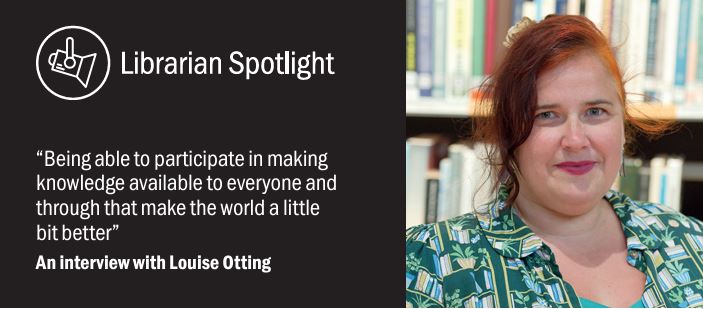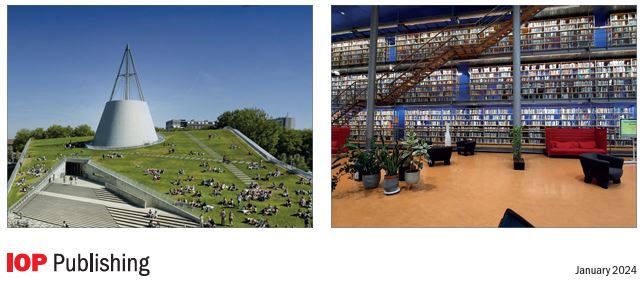The Publication and Collection Taskforce team received a call to write about the current publication culture and the concerns we have. Aided by our colleagues at the TU Delft Library we wrote a discussion paper that was sent to the deans of the faculties as input for the yearly rounds our director, Irene Haslinger and liaison, Anke Versteeg embarked upon at the end of summer in 2023. Since the paper was well received, we now wish to share it with a wider audience and see what next steps we can take to chart our current publication culture. It is our aim to discuss and formulate next steps with all the stakeholders to work towards the publication culture we would like to achieve.
I’d like to thank my co-authors for their input and advice, Alastair Dunning, Karin Clavel, Frederique Belliard, Just de Leeuwe, Ymke Bresser, Anke Versteeg, Dirk Jan Ligtenbelt.

Introduction
We at TU Delft have made some amazing steps with Open Access Publishing. In 2022, 98% of our journal articles and 91% of our conference papers were available open access. TU Delft is at the forefront of a (inter)national trend. Nevertheless, numerous problems remain embedded in the broader publishing system. It remains slow and expensive; it lacks innovation; it is globally divisive; and forces scientists to operate in a stressful system that is inimical to good research practices.
This document outlines five problem areas that are discussed on a (inter)national level as well. We would like to hear the input of the faculties to formulate a course of action and have some suggestions specific for the TU Delft.
Financial
The dominant publishing model for Open Access publishing – the Gold Open Access model where researchers pay Article Processing Charges (APC) – is unsustainable. Commercial publishers need to increase profit each year for their stakeholders, this pressurizes the academic community into working according to the publishers’ needs.
The transformative deals have not delivered what was expected. Although some journals have moved to Open Access, many publishers continue to use hybrid models. This means that TU Delft pays both for subscriptions and APC’s. This process – called ‘double dipping’ – means that costs do not go down. The overall costs for TU Delft cannot be maintained.


We publish more and that means the number of APC’s is rising, but something doesn’t add up. In the last 5 years we have grown 26,5% (from 3234 in 2018 to 4091 in 2022) in FTE of scientific staff, but the number of articles published by TU Delft researchers Delft increased by 73% (from 750 in 2018 to 1298 in 2022). This would account for a certain rise in costs, but it turns out that a big influence is that the price of APC’s is rising as well. If this rate continues, then we will be paying over 1.1m Euros per year by 2028. These developments make it nearly impossible to establish a sustainable publication budget.
Innovation (and the lack thereof)
The current publication system mimics centuries old typesetting traditions and captures them in the PDF format. This also remains the norm for long term preservation and no longer fits the needs of academics. It ignores the possibility to embed interactive data and software, algorithms. Plots, graphs and other visualizations become static. “It’s incalculable, literally … how much is lost, and how much time is wasted, and how many results are misinterpreted or are misrepresented.” summarized one researcher in an article in 2018.1
Other forms of innovation are also missed – the publish or perish pressure negates the value in publishing negative results. There is a lack of innovation I the area’s we require, for example, diversity of content published as well as recognition of new publication types and (hidden) research work that every academic does.
Psychological (wellbeing)
Gold APC Open Access has not reduced researchers’ stress levels. Indeed, it may have exacerbated it. The ‘Publish or Perish’ culture remains. A Wellcome Institute report “blamed funders and institutes that emphasize performance indicators and metrics such as number of publications and the impact factors of journals in which researchers publish.”2 Even journals such as Nature admitted this themselves in an article over reforming the journal impact factor: “The resulting pressures and disappointments are nothing but demoralizing, and in badly run labs can encourage sloppy research that, for example, fails to test assumptions thoroughly or to take all the data into account before submitting big claims.” 3 The increased number of articles need to be peer reviewed as well, which creates another demand to peer review for free and in a short amount of time. Simply, there are too many articles being published, and not enough time to process and read them.
Boundaries and self-care are difficult to maintain because as a researcher you want to support your colleagues in the field and it is implicated that if you say no a few times this might influence your chances when you want to publish yourself.
Efficiency
The peer review process is the core component of scholarly communication. Yet it desperately needs reform.4 5 There is a loss of control by the researchers since commercial publishers decide on the rhythm of publications and on the quality of the research that is published.
Peer review is based on hard to find volunteer labor that lacks the right incentives and can be based on exclusive networks and processes that are neither open nor transparent.
It is important to note that peer reviewed does not automatically equal quality. The Journal impact factors could cause the Matthew effect.
Moral
Gold OA still fails to bring true inclusiveness to scholarly communication. For the Global South, the problem has shifted from not being able to pay to read to not being able to pay to publish. Outside the rich western universities, there is an inability to pay the high APC charges. Scientific discourse is severely hampered if Global South researchers cannot contribute.6 And even within the western countries, the requirement to pay APCs provides an advantage to established scientists.7
Negative results are not profitable, so are often not published and become ‘invisible’, even if the results are important and meaningful. This distorts the story being told, which in turn feeds into the distrust in scientific research/ scientific methods.
Call to Action
There are various steps the university can take to help improve this situation. But firstly, we look to open up the discussion within the university and individual faculties.
We ask faculties to
• Help organize department or faculty wide meetings to discuss the current publication culture
• Continue (or start) the ongoing contribution of the faculty Publication Taskforces
• Facilitate interviews at an individual or team level to better understand the publication culture within your faculty.
• Promote TU Delft OPEN Publishing, our diamond university press.
Supporting Library projects
The TU Delft Library Service Design team is facilitating a deep dive into our current expectations and needs regarding publishing. They organize sessions with different stakeholders and are looking into the publication journey.
We have funding from the Open Science program to run a pilot where 3 PhD’s examine what type of publishing support or services are needed in 3 faculties until the end of 2023. If results are promising and we have a proof of concept, we could extend this period of time.
If you have ideas, feedback or other comments I’d very much like to hear them. You can leave a comment or e-mail me directly.

Additional Publications
• Akterian, S.G. (2017). Towards Open Access Scientific Publishing. Biomedical Reviews 28:125-133. DOI: 10.14748/bmr.v28.4459
• Ali, I., Burton, J., and Tranfield, M.W. (2023). Assessing the publishing priorities and preferences among STEM researchers at a large R1 institution. Heliyon 9:e16316. DOI: 10.1016/j.heliyon.2023.e16316
• Baffy, G. et al. (2019). Scientific Authors in a Changing World of Scholarly Communication: What Does the Future Hold? The American Journal of Medicine, 133(1)26-31. DOI: 10.1016/j.amjmed.2019.07.028
• Barness, J. and Papaelias, A. (2021). Readable, Serious, Traditional: Investigating Scholarly Perceptions of the Visual Design and Reading Experiences of Academic Journals. She JI, 7(4)540-564. DOI: 10.1016/j.sheji.2021.10.005
• Chiriboga, L. (2019). The changing landscape of scientific publishing. Journal of Histotechnology 42(3)95-97. DOI: 10.1080/01478885.2019.1636554
• Cutri, J. et al. (2021). Academic integrity at doctoral level: the influence of the imposter phenomenon and cultural differences on academic writing. International Journal for Educational Integrity, 17(1):8. DOI: 10.1007/s40979-021-00074-w
• Fiala, C. & Diamandes, E.P. (2017). The emerging landscape of scientific publishing. Clinical Biochemistry, 50:651–655. DOI: 10.1016/j.clinbiochem.2017.04.009
• Frankl, J. (2023). Towards an Author-Centered Open Access Monograph Program: Understanding Open Access Cultures in Scholarly Publishing. The Journal of Electronic Publishing, 26(1)47-76. DOI: 10.3998/jep.3332
• Gonzalez, P., Wilson, G. S., & Purvis, A. J. (2022). Peer review in academic publishing: Challenges in achieving the gold standard. Journal of University Teaching & Learning Practice, 19(5). URL
• Goddiksen, M.P. et al. (2023). “The person in power told me to”—European PhD students’ perspectives on guest authorship and good authorship practice. PLoS ONE, 18(1):e0280018. DOI: 10.1371/journal.pone.0280018
• Herman, E. et al. (2020). The changed – and changing – landscape of serials publishing: Review of the literature on emerging models. Learned Publishing, 33:213–229. DOI: 10.1002/leap.1288
• Hopf, H. et al. (2020). Blocking the Hype-Hypocrisy-Falsification-Fakery Pathway is Needed to Safeguard Science. Angewandte Chemie International Edition, 59:2150–2154. DOI: 10.1002/anie.201911889
• Kaltenbrunner, W. et al. (2022). Changing publication practices and the typification of the journal article in science and technology studies. Social Studies of Science, 52(5)758–782. DOI: 10.1177/03063127221110623
• >Koong, A. et al. (2023). Factors Associated With Open Access Publishing Costs in Oncology Journals: Cross-sectional Observational Study. JMIR Formative Research, 7:e44633. DOI: 10.2196/44633
• Saarti, J. and Tuominen, K. (2017). From paper-based towards post-digital scholarly publishing: an analysis of an ideological dilemma and its consequences. Information Research, 22(3):paper 769. URL
• Siler, K. (2017). Future Challenges and Opportunities in Academic Publishing. Canadian Journal of Sociology/Cahiers Canadiens de Sociologie, 42(1)83-114. URL
• Tennant, J.P. et al. (2019). Ten Hot Topics around Scholarly Publishing. Publications, 7(2)1-24. DOI: 10.3390/publications7020034
• Teixeira da Silva, J.A. (2021). How to shape academic freedom in the digital age? Are the retractions of opinionated papers a prelude to “cancel culture ”in academia? Current Research in Behavioral Sciences, 2:100035. DOI: 10.1016/j.crbeha.2021.100035
• Tonetti, M.S. (2019). Leadership in publishing. Journal of Dentistry, 87:28-31. DOI: 10.1016/j.jdent.2019.05.006
• Torres, C.G. (2022). Editorial misconduct: the case of online predatory journals. Heliyon, 8:e08999. DOI: 10.1016/j.heliyon.2022.e08999






